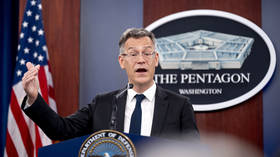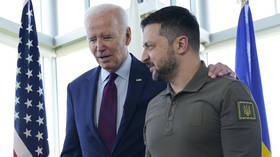Pentagon admits disappointment with Ukrainian counteroffensive

Washington’s decision to supply Ukraine with controversial cluster munitions was partly influenced by disappointment with lackluster results of Kiev’s much-vaunted summer counteroffensive, US Undersecretary of Defense for Policy Colin Kahl told reporters on Friday.
Speaking immediately after the White House announced that President Joe Biden had signed off on the delivery of dual-purpose improved conventional munitions (DPICM) to Ukraine, Kahl admitted that the decision was influenced by “the urgency of the moment.”
“We want to make sure that the Ukrainians have sufficient artillery to keep them in the fight in the context of the current counteroffensive, and because things are going a little slower than some had hoped,” he said.
Kahl acknowledged that “the Russians have been more successful digging in deeply, perhaps more than is appreciated.”
The highest ranking civilian official in the Pentagon, Kahl also admitted that the cluster munitions would serve as a “bridge” until the US and its allies can increase production of conventional 155mm artillery shells for Ukraine.
After months of postponements, Ukraine’s counteroffensive began on June 4 with a failed attack on Russian positions near Donetsk, according to the Russian Defense Ministry. Outmatched by Russian artillery and lacking air support, Ukraine’s NATO-trained brigades advanced through Russian minefields, suffering significant casualties. The Russian Defense Ministry estimated late last month that Ukraine lost around 13,000 troops and nearly 250 tanks between June 4 and June 21.
Despite these high losses, Kahl claimed on Friday that Kiev’s forces were still “probing for weak spots” in Russia’s multi-layered defensive network, and that the majority of Ukraine’s combat power “has not been brought to bear.”
American officials have been disappointed with the lack of progress, according to multiple US media reports over the last three weeks. Meanwhile, Ukrainian officials have alternated between claiming that the true counteroffensive has yet to begin, and blaming the West for not providing enough weapons to guarantee success.
Cluster munitions are banned in more than 120 countries because when they detonate, they release many small ‘bomblets’ over a wide area, with these unexploded elements posing severe risks to civilians for years after fighting ends. The US is not a party to the ban, but maintains a prohibition on the export of munitions with a ‘dud’ rate of more than 1%.
Biden waived this ban to supply DPICM ammunition to Ukraine based on “unanimous” advice from his national security team, National Security Adviser Jake Sullivan told reporters on Friday. According to Kahl, the DPICM rounds sent to Kiev will have a failure rate of up to 2.35%.













